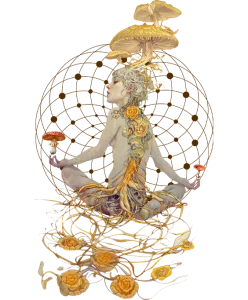Introduction
Anxiety disorders are among the most prevalent mental health issues worldwide, affecting millions of people each year. While traditional treatments such as cognitive-behavioral therapy and prescription medications are effective for many, they often come with limitations, including side effects, withdrawal symptoms, and a lack of efficacy in some patients. As a result, there is growing interest in alternative treatments, including the use of natural psychedelics for anxiety relief. These psychoactive substances, derived from plants and fungi, offer a novel approach to managing anxiety, particularly in cases where conventional treatments have failed. This article explores the potential of natural psychedelics, such as psilocybin mushrooms, ayahuasca, and peyote, in providing relief from anxiety and examines the scientific evidence, therapeutic mechanisms, and considerations for their use.
Understanding Anxiety and Its Impact
Anxiety is a natural response to stress, but when it becomes chronic or excessive, it can lead to significant mental health issues that interfere with daily life. Anxiety disorders, including generalized anxiety disorder (GAD), social anxiety disorder, panic disorder, and specific phobias, can manifest in various ways, from persistent worry and fear to physical symptoms such as increased heart rate and high blood pressure. These symptoms can be debilitating, affecting a person’s ability to work, socialize, and maintain relationships.
Traditional treatments for anxiety typically include psychotherapy, such as cognitive-behavioral therapy, and pharmacotherapy with prescription medications like SSRIs (selective serotonin reuptake inhibitors). While these treatments are beneficial for many, they have limitations. Medications can cause side effects, including withdrawal symptoms upon discontinuation, and are not always effective in managing anxiety. This has led researchers and clinicians to explore alternative treatments, including natural psychedelics, for their potential mental health benefits.
Natural Psychedelics: An Overview
Natural psychedelics, also known as entheogens, are psychoactive substances derived from plants or fungi that induce altered states of consciousness. These substances have been used for centuries in various cultural and spiritual practices for their mind-altering effects and potential healing properties. In recent years, there has been renewed scientific interest in natural psychedelics, particularly for their potential therapeutic benefits in treating mental health conditions, including anxiety disorders.
1. Psilocybin Mushrooms
Psilocybin mushrooms, commonly known as magic mushrooms, are one of the most well-known natural psychedelics. The active compound in these mushrooms, psilocybin, is converted into psilocin in the body, which interacts with serotonin receptors in the brain. Psilocybin has been shown to produce profound changes in perception, mood, and cognition and has been studied extensively for its potential in treating anxiety, particularly in patients with terminal illnesses or those suffering from post-traumatic stress disorder (PTSD).
2. Ayahuasca
Ayahuasca is a traditional Amazonian brew made from the Banisteriopsis caapi vine and the Psychotria viridis leaf. The brew contains DMT (N,N-Dimethyltryptamine), a powerful psychedelic compound, and MAO inhibitors that allow DMT to be active when ingested orally. Ayahuasca has been used for centuries in shamanic rituals for healing and spiritual purposes. Recent studies have highlighted its potential to relieve anxiety, depression, and PTSD, making it a subject of interest for those seeking alternative treatments for mental health issue3. Peyote and Mescaline
Peyote is a small cactus native to the southwestern United States and Mexico, known for its psychoactive properties due to the presence of mescaline. Mescaline is a naturally occurring psychedelic alkaloid that has been used in Native American religious ceremonies for centuries. Peyote is considered sacred by many indigenous cultures and is used for its ability to induce deep introspective and mystical experiences, which can contribute to emotional healing and anxiety relief.
The Science Behind Natural Psychedelics and Anxiety Relief
The potential of natural psychedelics for anxiety relief lies in their ability to modulate neurotransmitter systems in the brain, particularly the serotonergic system. Serotonin is a key neurotransmitter involved in regulating mood, anxiety, and emotional responses. By interacting with serotonin receptors, particularly the 5-HT2A receptor, psychedelics can alter brain activity in ways that may help reduce anxiety.
1. Modulation of the Default Mode Network (DMN)
One of the most significant effects of psychedelics is their impact on the brain’s default mode network (DMN), a network of brain regions that is active during introspective thought and self-referential processing. In people with anxiety, the DMN can become hyperactive, leading to excessive rumination and negative thinking. Psychedelics are thought to disrupt the normal functioning of the DMN, leading to a temporary “reset” that can reduce anxiety and promote a sense of well-being.
2. Enhanced Emotional Processing
Psychedelics are known to enhance emotional processing, allowing individuals to confront and process deep-seated fears and traumas. This can be particularly beneficial for those with anxiety disorders, as it may help them gain new insights and perspectives on their condition. Studies have shown that psilocybin can produce lasting reductions in anxiety and depression in patients with life-threatening illnesses, suggesting that these substances can help people come to terms with existential fears.
3. Increased Neuroplasticity
Neuroplasticity, the brain’s ability to reorganize itself by forming new neural connections, is another key mechanism through which psychedelics may relieve anxiety. Psychedelics have been shown to increase neuroplasticity, allowing the brain to break free from maladaptive patterns of thought and behavior. This enhanced plasticity may facilitate the learning of new, healthier ways of coping with stress and anxiety.
4. The Role of Larger Doses and Single Dose Therapies
While micro-dosing (taking sub-perceptual doses) has gained popularity, the use of larger doses of psychedelics in a controlled setting has shown more significant results in clinical studies. In some cases, even a single dose of psilocybin or another natural psychedelic has been reported to produce profound and lasting changes in anxiety levels. This approach, often referred to as psychedelic-assisted therapy, combines the administration of a psychedelic drug dose with therapeutic support, creating an environment where patients can explore their anxiety in a transformative way.
Therapeutic Use of Natural Psychedelics for Anxiety Relief
While the potential benefits of natural psychedelics for anxiety relief are promising, their use in a therapeutic context requires careful consideration. Psychedelic-assisted therapies typically involve the administration of a psychedelic substance in a controlled, supervised setting, often combined with psychotherapy. This approach is designed to maximize the therapeutic benefits while minimizing the risks.
1. Set and Setting
The concepts of “set and setting” are critical in psychedelic therapy. “Set” refers to the individual’s mindset going into the experience, including their expectations, fears, and overall mental state. “Setting” refers to the physical and social environment in which the experience takes place. A safe, supportive setting, along with the guidance of a trained therapist, is essential for achieving positive outcomes in psychedelic therapy.
2. Integration
Integration is the process of making sense of the psychedelic experience and incorporating the insights gained into everyday life. This is a crucial part of the therapeutic process, as the insights and emotions that arise during the psychedelic experience can be profound and sometimes challenging to process. Integration typically involves follow-up therapy sessions where the individual can explore the meaning of their experience and work through any unresolved issues.
3. Psilocybin-Assisted Psychotherapy and Behavioral Therapy
Psilocybin-assisted psychotherapy is one of the most researched forms of psychedelic-assisted therapy. Clinical studies have shown that psilocybin, when administered in a therapeutic setting, can lead to significant reductions in anxiety and other mental health symptoms. This approach often involves a combination of psilocybin administration and behavioral therapy, where the patient works with a therapist to address underlying issues contributing to their anxiety. The therapeutic effects of psilocybin can be enhanced through this combination, leading to more lasting and meaningful changes.
4. Clinical Studies and Human Subjects
The therapeutic potential of natural psychedelics has been supported by various clinical studies involving human subjects. These studies have demonstrated the safety and efficacy of psychedelics in reducing anxiety, particularly in patients with medical conditions such as terminal illness or PTSD. For example, a landmark study at Johns Hopkins University found that psilocybin-assisted therapy led to significant reductions in anxiety and depression in patients with life-threatening cancer. These findings have sparked further interest in the use of psychedelics as a treatment for anxiety and other mental health issues.
Considerations and Risks
While natural psychedelics hold promise for anxiety relief, they are not without risks. Psychedelics can produce intense, sometimes overwhelming experiences that may not be suitable for everyone, particularly those with a history of psychosis or severe mental illness. The altered states of consciousness induced by psychedelics can lead to challenging psychological experiences, known as “bad trips,” which can be distressing and difficult to manage without proper support.
1. Legal Status and Illicit Drugs
The legal status of natural psychedelics varies by jurisdiction, and they are classified as Schedule I substances under federal law in the United States, meaning they are considered to have a high potential for abuse and no accepted medical use. However, there are exemptions for religious use, and some states and cities have moved to decriminalize or legalize their use. Individuals interested in exploring psychedelics for anxiety relief should be aware of the legal implications and seek treatment in jurisdictions where it is permitted.
2. Contraindications and Screening
Not everyone is a good candidate for psychedelic therapy. Individuals with a personal or family history of schizophrenia, bipolar disorder, or other psychotic disorders may be at increased risk of adverse effects.


